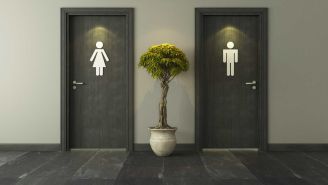Updated on October 23, 2024.
Overactive bladder (OAB) affects approximately 33 million people in the United States, though the number of people with symptoms is thought to be significantly higher. The condition, defined by an abrupt, strong need to urinate, isn't usually considered a serious health problem, but it can be difficult to deal with. People with the condition can feel anxious and depressed, and may have difficulties with work and relationships.
Risk factors for overactive bladder
There's no single illness or reason for overactive bladder. A range of things can contribute to your risk, and many more conditions and behavioral habits may exacerbate symptoms. These include the following.
Age
The chances of developing OAB increase with age. Part of this is simply because your body might not function as well as you get older. Urinary tract muscles frequently lose strength and flexibility with the passing of time.
Cognitive function may decline, as well, slowing communication between the bladder and the brain. With age, you may also be more likely to develop illnesses connected to OAB, like diabetes.
Obesity
Research suggests that carrying extra weight increases the chance of developing OAB. Obesity-related OAB can be caused by mechanical issues, including increased pressure on the bladder, stretched pelvic muscles, reduced blood flow, and decreased nerve sensation, which contribute to leakage and feelings of urgency. Obesity-related inflammation and insulin resistance may also play a role in OAB. When treating OAB, one of the first lines of treatment is losing weight.
Neurological conditions and nerve damage
People are likelier to experience OAB when irregular nerve signals tell the bladder to contract suddenly when it's not full. This can be a result of an injury affecting your brain, nerves, or spinal cord, like trauma, herniated discs, back surgery, or radiation therapy. It could also be a consequence of a health condition affecting neurological function, like diabetes, dementia, Parkinson's disease, stroke, or multiple sclerosis.
Infection
If you have a urinary tract infection, it can make the nerves in your bladder irritated. That might cause the bladder to spasm, or squeeze involuntarily, which can make you feel an intense urge to urinate.
Prostate conditions and other blockages
Urine must have a clear path for the bladder to function correctly. When something is blocking that conduit, whether it's an enlarged prostate, bladder stones, constipation, or, less frequently, a tumor, you may feel the need to urinate frequently. This can mimic the signs of OAB. Certain surgeries, including prostate or pelvic surgery, may also contribute to the obstruction of urine flow.
Sex assigned at birth
Some individual studies find men and women develop OAB at equal rates, while others have discovered rates that seem somewhat higher in women, especially postmenopausal women. After menopause, hormone shifts, particularly estrogen loss, can cause the bladder and urinary tract to weaken. People who have had multiple pregnancies are at an increased risk for OAB, since pregnancy can weaken pelvic floor muscles, which help control urination. The bladder can sag a little and move out of its position if the muscles aren’t strong enough to support it.
However, despite these unique risk factors associated with women’s health, according to a 2019 meta-analysis of 28 studies, statistically speaking, women don’t seem to be at a higher overall risk of developing OAB than men.
Gastrointestinal disorders
About 33 percent of people with OAB also have irritable bowel syndrome (IBS), so if you have IBS, your risk of developing OAB may be higher. IBS is a condition that causes symptoms related to bowel movements, bloating, and pain. It’s not clear why these two are associated. More research is needed.
Other risk factors may include:
- Smoking, which may irritate the bladder.
- Obstructive sleep apnea (OSA), which may be linked to OAB possibly because lack of oxygen affects the way the urinary tract functions. OSA is when the airway briefly collapses during sleep, causing your breath to stop and start repeatedly for brief periods of time. This can lower oxygen levels in your blood.
- Certain medications, which can cause you to urinate more often. These include diuretics (“water pills”) and alpha blockers, which are often used to treat high blood pressure or an enlarged prostate, and some antidepressants and pain medications.
- Too much caffeine, which may cause your bladder to fill too fast.
- Mobility issues, including arthritis, which may prevent you from getting to a bathroom in time to urinate.
- Ethnicity may also be a factor, as some small studies have shown that African American and Hispanic people experience OAB at a higher rate than other groups, but more research needs to be done.
If you believe you may be displaying symptoms of OAB, see your healthcare provider, who can diagnose your condition and prescribe a course of treatment.







